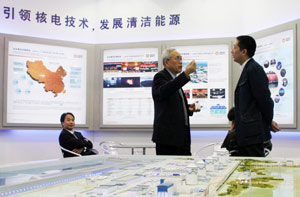China feels diesel pinch
Updated: 2011-10-24 16:53
(Xinhua)
|
|||||||||||
BEIJING -- China is facing renewed pressure over shortfalls in diesel, with private gas stations scouring the country for supplies and lines growing at filling stations in major cities.
Diesel shortages arise every September and October, the traditional peak months for diesel use in the world's fastest-growing major economy.
However, this year's diesel supplies are tighter than usual after the National Development and Reform Commission, the country's top economic planning agency, cut retail prices for gasoline and diesel by 300 yuan ($46.88) per metric ton on Oct 8.
The decrease marks the first fuel price reduction for the past 16 months.
"I'm unable to get any diesel after the price cut," said a manager surnamed Lin, who runs one private petroleum company and four filling stations in East China's Zhejiang province.
"All stocks at the four fuel stations have been sold out. Now, we have no diesel available at all," Lin said.
Lin said he is deeply concerned about the diesel shortages as he will lose over 10,000 yuan every day if his stations continue running out of diesel.
The shortages, which are often reported in wealthy areas in southern and eastern China, appear to be spreading to the country's inland regions, including Anhui, Sichuan and Hubei provinces as well as Chongqing Municipality.
Lin is not the only person who is worried about being able to get diesel.
Zhao Youshan, chairman of the Commercial Petroleum Flow Committee of China, said that all privately-owned filling stations in Inner Mongolia autonomous region are struggling to get shipments from refiners.
Diesel users are also facing the fuel pinch due to the tight supplies. In the central city of Wuhan, truck driver Hu shuisheng was just back from what should have been a four-day trip to Shandong province.
"The trip stretched to six days because so many filling stations ran out of diesel that I had to wait overnight until they had diesel again," Hu said.
"I have gone to twelve filling stations today, but they all have no diesel. Now I dare not drive far because I can't get diesel," a truck driver surnamed Liu said.
PetroChina and Sinopec, the country's two largest oil suppliers which together hold a dominant market share of more than 80 percent, have often been blamed for fuel shortages.
Chinese media and industry experts accused the two state-owned oil companies of stockpiling diesel to pressure the government to raise prices.
The two oil suppliers have denied such allegations, saying all their refineries are operating at full capacity and are not rationing how much customers can buy.
According to data from Sinopec, starting this month, retail sales of diesel averaged a record high of 280,000 metric tons per day at the company's sales outlets nationwide, a year-on-year increase of 9.9 percent.
Statistics provided by PetroChina also showed that the company has tried its best to ensure supplies.
The refiner's daily output of processed oil products rose 8.5 percent from one year earlier to reach 267,000 metric tons so far this year.
PetroChina said its oil supplies climbed 16.7 percent year-on-year as of Oct 17, while its diesel supplies gained 23.9 percent.
Sinopec said that the recent diesel price cut eroded profits of small oil companies and dampened their production enthusiasm.
The rebound of overseas crude prices widened the gap between international crude oil values and centrally-controlled fuel prices, which prompted domestic refiners to increase oil exports and that was another reason that led to recent fuel shortages, Sinopec said.
The refiner said it will ramp up production to help meet strong fuel demand amid rapid economic growth.
Sinopec said it plans to process 18.3 million metric tons of crude oil in November, a year-on-year increase of 2.8 percent, which means its daily processing capacity will reach a record high of 590,000 metric tons.
State-owned oil companies should shoulder their responsibility of ensuring supplies as they monopolize oil imports, said Lin Boqiang, director of the China Center for Energy Economics Research at Xiamen University.
"Privately-owned filling stations account for more than 45 percent of the country's total number. If their diesel supplies run low, how can state-owned oil companies claim that they have guaranteed sufficient supplies?" Lin said.
Related Stories
Private fuel stations scramble as diesel supplies tank 2011-10-21 10:48
China to cut fuel, diesel prices 2011-10-08 17:13
- China feels diesel pinch
- Official news websites prepare for IPOs in Shanghai
- CPI to cool to under 5% in coming months: NDRC
- Old woman seeks Carrefour apology
- BMW 9-month sales surpass full 2010 tally
- Toyota to produce hybrid vehicles by 2015
- Food executives charged with graft at State group
- Double-dip recession unlikely










